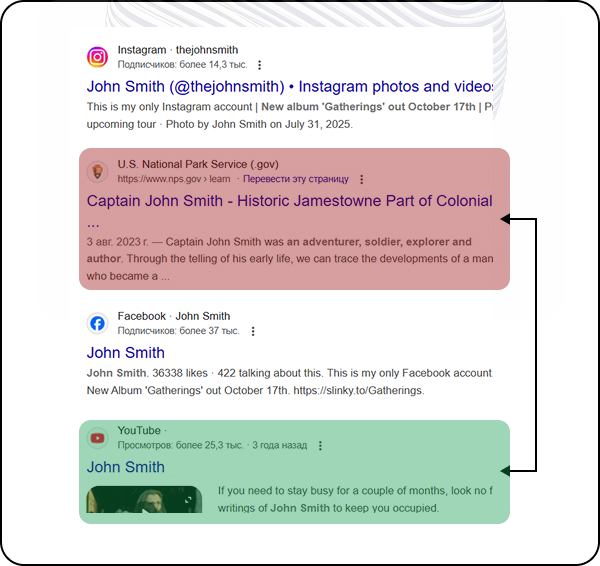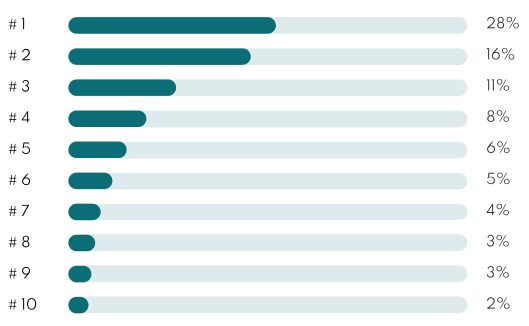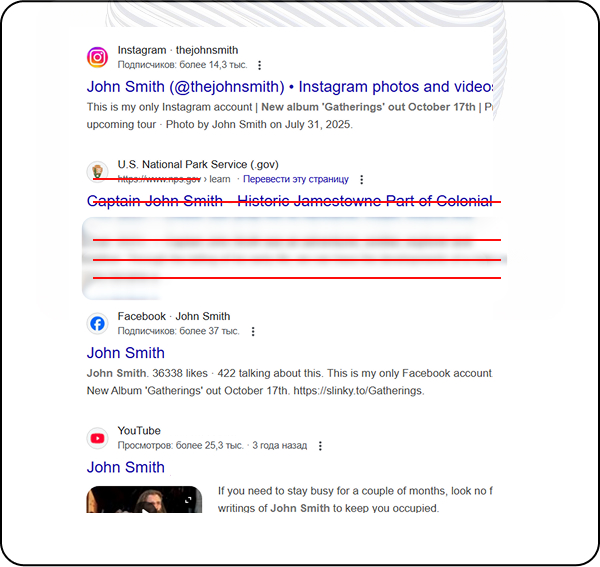We guarantee 100% confidentiality
WHAT WE DO?
Control Search Results
Take charge of your online reputation. Using cutting-edge software, our in-house SEO experts, professional writers, legal tools, and advanced algorithm knowledge, we can craft a plan to promote the content you want visible while pushing negative content off the first page.
-
The average Google Search session is just under 1 minute. This means that within 1 minute the average user has already made
-
Up to 72% of people will make a decision to avoid you upon finding negative content online; and
-
88% of consumers trust online content as much as a personal recommendation.

Google Orgranic CTR Breakdown by Position
If bad press ranks in the first few positions of Google for your brand or name, it's a major problem because most users never scroll past the first few results—and click-through rate (CTR) becomes a key signal that can either help bury the bad press or make it stick longer.


| Option | Effectiveness | Cost |
| #1.Waiting For Negative Articles To Naturally Fall Off The First Page | Low | Free |
| #2.Submit a DMCA (Digital Millennium Copyright Act) Takedown Notice on Google | Low | Free |
| #3. Hire an SEO Expert⭐️Ross Kernez⭐️to Clean Your Name or Brand | High | $$ |
| #4. Reaching Out To Journalists to Take Down Content from Google Search | Low | Free |
| #5. Explore Legal Strategies to Take Down Negative Content Online | Medium | $$$ |
| #6. Requesting an Update To a Negative Article Via Email Outreach | Low | Free |
Relying solely on Google’s Freshness Systems to let bad press “fade away” is a passive defense that keeps you exposed. Search algorithms surface what earns interest right now, not what’s best for your brand tomorrow—so if an unflattering article still attracts clicks, it will keep climbing back to the top of the results page.
Every click, share, or comment on a damaging headline signals continued relevance to Google’s ranking models. That digital engagement acts like oxygen, allowing critical stories, forum rants, and dated blog posts to linger indefinitely and dominate brand-related searches long after the initial news cycle ends.
The only reliable antidote is an active reputation-management program: produce and optimize fresh, authoritative content that tells your side of the story, earn positive media placements, and continuously monitor search results to identify and neutralize emerging threats. Without that deliberate effort, you risk letting stale negativity harden into the first—and lasting—impression people see when they Google your name.
When your intellectual property is being copied without permission, a properly filed Digital Millennium Copyright Act (DMCA) notice is one of the fastest levers you can pull—especially if the infringing material appears on a site indexed by Google. By leveraging Google’s own legal-removal process, you bypass tedious back-and-forth with the infringer and target the very place most people discover that stolen content: the search results page.
The key is meticulous documentation and precision. Capture full-page screenshots, record the exact URLs where the violation occurs, and assemble proof of your ownership—such as registration certificates, publication dates, or original source files. With that evidence in hand, complete Google’s DMCA webform, include the required good-faith and electronic-signature statements, and submit. Don’t stop there: mark your calendar to check the case status, respond immediately to any follow-up questions, and re-file if mirrored copies pop up elsewhere.
Executed correctly, a DMCA takedown can remove the offending page—or at least the specific infringing element—from Google’s index within days, dramatically reducing its visibility. The result is a cleaner first page for your brand or product searches, fewer confused customers landing on counterfeit material, and a clear signal that you actively defend your creative rights.

Bringing in a dedicated SEO professional like Ross KernEZ—whose core focus is online reputation management—condenses the months-long grind of “waiting it out” into a purpose-built campaign measured in weeks. Instead of letting algorithms and chance dictate what prospective clients read first, you gain a strategist who diagnoses every SERP weakness, prioritizes fixes by business impact, and applies proven playbooks that move search sentiment in your favor.
Ross orchestrates a full-stack content and authority push: commissioning keyword-aligned articles that answer real user intent, lining up third-party press mentions that earn trustworthy backlinks, launching niche microsites that rank for branded queries, and weaving a cohesive social media narrative that drives fresh engagement signals. Each asset is engineered to occupy prime real estate on Google and to siphon clicks—and therefore algorithmic “oxygen”—away from outdated or hostile pages.
Journalists remain powerful gatekeepers of what the public—and Google—perceive as authoritative. Reaching out to a reporter with a calm, evidence-driven briefing can convert a one-sided hit piece into a balanced or even favorable update, because most reputable outlets take factual accuracy and timeliness seriously. Your goal is not a confrontation, but a collaborative fact-check that helps the writer correct the record while preserving their editorial integrity.
Start by assembling a tight packet of proof: verifiable documents, third-party data, on-the-record quotes, and an easy-to-scan timeline that highlights where the original article is outdated or incomplete. Then craft a concise email that (1) acknowledges the journalist’s work, (2) flags the specific inaccuracies with referenced evidence, and (3) offers an alternative angle—ideally a forward-looking story that aligns with the writer’s beat. Pair this with access to subject-matter experts, high-quality visuals, or new research so you’re not merely requesting a correction, but delivering fresh value that can turn a simple edit into a newsworthy follow-up piece.
When journalists update, correct, or replace the original story, Google’s crawlers treat that refreshed content as new, diluting the ranking signals of older negative versions. Over time, the updated article (or entirely new coverage with a positive frame) earns backlinks and engagement that eclipse the initial hit, pushing the outdated narrative further down the results page. By proactively guiding reporters toward accuracy and relevancy, you transform media scrutiny from a reputational risk into a catalyst for authoritative, search-friendly stories that reflect your current reality.
Pursuing a defamation lawsuit may feel like the bold way to silence critics, but it usually turns into an expensive, years-long slog that fuels the very narrative you hope to bury. Court filings are public documents; once the complaint is lodged, journalists gain a new angle, bloggers dissect every motion, and social-media pundits reshare the original allegation—perfect conditions for the “Streisand Effect” to push negative coverage even higher in Google results.
Legal standards make the climb steeper still. To prevail, you must prove statements are both false and harmful, clear the “actual malice” bar if you’re a public figure, and survive anti-SLAPP challenges designed to protect free speech. Each hearing invites fresh headlines, and every headline becomes another searchable page that prolongs and multiplies reputational damage.
Redirecting those resources into proactive reputation management delivers faster, more sustainable returns. By publishing authoritative content, securing favorable media placements, and optimizing your digital footprint, you can crowd out outdated or inaccurate stories without court subpoenas—or the risk of turning a private grievance into a public spectacle. The result is a cleaner search landscape achieved through strategy, not litigation.
Issuing a courteous request for a content update is often the shortest path to defusing harmful coverage. Most reputable outlets value accuracy above all; when you approach them with a calm, professional tone—instead of threats or complaints—you signal that you are a cooperative source, not an adversary. That earns you a genuine hearing and can transform a lingering negative search result into an updated, neutral (or even positive) page that Google immediately recrawls and re-ranks.
The ask must be evidence-led. Gather verifiable documents, timestamps, and third-party statements that prove what has changed since the piece first ran or where factual slip-ups occurred. Package those materials in a concise, bullet-pointed brief so a busy editor can confirm them in minutes. By framing the update as a matter of journalistic accuracy and fairness—not brand image—you align your goals with theirs and make the request hard to dismiss.
When you invite the journalist into a collaborative rewrite—offering fresh quotes, new data, or expert commentary—you turn a simple correction into a newsworthy refresh that benefits both parties. That new angle attracts engagement, draws inbound links, and quickly eclipses the original story in search results. The outcome is a search-page presence that feels balanced, credible, and current—achieved through partnership rather than confrontation.
What Does It Mean to “Push Down” Negative News Articles Online?
“Pushing down” negative news articles refers to the process of using various online reputation management strategies to make unfavorable or damaging content appear lower in search engine results, ideally beyond the first page. The primary goal of this strategy is to reduce the visibility of negative content while promoting more positive or neutral information that can be easily found. By doing so, individuals or businesses can improve their public perception, reduce the damage caused by bad press, and regain control over their online image.
Why Is It Important to Push Down Negative News Articles?
The importance of pushing down negative news articles largely depends on the potential harm these articles could cause to a person’s or business’s reputation. For professionals and companies, negative articles can result in lost business opportunities, damaged partnerships, and a tarnished public image. For individuals, negative news coverage can lead to issues such as damaged personal relationships, challenges in finding employment, or a general decline in public trust. For brands, bad press can drive customers away, affecting sales, customer loyalty, and overall success. Moreover, some individuals and businesses are motivated by privacy concerns, wanting to protect themselves from false, misleading, or overly intrusive information.
Can Negative News Articles Be Pushed Down from Google Search?
In most cases, Google does not allow the removal of news articles unless they violate specific policies, such as defamation, privacy rights, or illegal content. Google’s search algorithm prioritizes content from authoritative and trusted websites, so the content of a news article is usually difficult to take down unless you take legal action or the article violates Google’s content guidelines. If the article contains personal information or defamatory statements, you may be able to request removal through legal channels or by filing a formal request with Google. However, even when a news article is taken down, it may still appear on other websites or platforms, and may continue to be accessible in some form.
What Are Some Effective Strategies for Pushing Down Negative Articles?
One of the most effective ways to push down negative news articles is to create and promote positive content. By producing high-quality blog posts, articles, press releases, and other online content, you can crowd out the negative press with content that presents you or your business in a more favorable light. The key is consistency: regularly publishing new content on a variety of platforms can push down negative articles over time.
Another critical element in improving your online reputation is Search Engine Optimization (SEO). By optimizing your positive content with relevant keywords and ensuring it is properly indexed by search engines, you can significantly increase its chances of ranking higher in search results than negative content. Additionally, building backlinks to your content from high-authority websites helps improve its search ranking. SEO is a long-term strategy, and the more valuable and authoritative your content is, the better your chances of pushing down negative articles.
Social media also plays a key role in reputation management. By actively posting positive updates, engaging with followers, and sharing content that highlights your successes, you can help boost the visibility of favorable content. Social media platforms like Twitter, LinkedIn, Facebook, and Instagram have strong search engine visibility and can help bury negative articles if managed correctly. Optimizing your social media profiles, using relevant keywords, and ensuring that your posts reflect your positive contributions or achievements can help shift the focus away from any negative content.
Diversifying your content is another effective strategy. Videos, podcasts, and infographics are all forms of content that can rank well in search results. Platforms like YouTube offer a significant opportunity to get content in front of a wider audience. Videos that highlight your expertise, personal story, or business milestones can be particularly effective at improving public perception. Podcasting, too, has grown in popularity and can help position you as an authority in your field, while infographics present complex information in a digestible, shareable format.
In some cases, it may be worth seeking the help of professional reputation management services. These services specialize in pushing down negative content through a combination of SEO, content creation, and digital marketing. While there is a cost associated with these services, they offer a more comprehensive approach and can expedite the process of improving your online image.
Paid advertising is another strategy that can help push down negative content. Running Google Ads or sponsored social media posts can increase the visibility of positive content, effectively suppressing unwanted search results. For example, a well-targeted Google ad campaign promoting a new product or service can drive traffic to your website or positive press coverage, thereby decreasing the visibility of negative news articles.
How Long Does It Take to Push Down Negative News Articles?
The timeline for pushing down negative news articles depends on several factors, including the strength of the negative content, how frequently you post new positive content, and how well you implement SEO strategies. For instance, if the negative article is hosted on a high-authority website, such as a well-known news outlet, it may take longer to suppress. However, consistent and strategic content creation, SEO optimization, and engagement with social media can improve your chances of pushing down the negative article within a few months.
In general, the more frequently you publish new content and the more authoritative that content is, the faster the process will be. SEO efforts, such as building backlinks and optimizing for relevant keywords, will also accelerate the suppression of negative articles. Keep in mind that pushing down negative content is a long-term commitment, and results may not be immediately noticeable.
Can I Use Google’s “Right to Be Forgotten” to Take down Negative Articles?
The “Right to Be Forgotten” is a legal framework that applies in some regions, such as the European Union, which allows individuals to request the removal of personal data from search engine results if the content is deemed outdated, irrelevant, or excessively harmful. This right typically applies to personal information or sensitive data that no longer serves a public interest. In the United States, the right to be forgotten does not exist in the same way, but certain legal remedies may be available if the negative content violates your privacy or defames you.
If a negative article contains false, misleading, or outdated information, you may have grounds to request removal through Google’s legal channels. However, this process is only applicable to certain types of content, and Google will evaluate whether the removal is warranted based on its content policies. If the article is factually correct or considered a matter of public interest, removal requests are typically denied.
How Do I Handle Defamation or False Information in Negative News Articles?
If a news article contains defamatory or false information, you may be able to take legal action. Defamation laws vary by jurisdiction, but they generally allow individuals to seek redress if they can prove that false statements have been made with the intent to harm their reputation. One option is to send a cease-and-desist letter to the publisher or journalist, demanding that the content be corrected or taken down.
In some cases, you may be able to pursue a defamation lawsuit if the damage caused by the false article is significant. Another option is to contact Google directly to request the removal of defamatory content if it violates Google’s content policies. However, this process is usually lengthy and does not guarantee success.
If the content is hosted on a reputable news site, reaching out to the publisher for a retraction or correction can also be effective. Some publishers are willing to amend their articles if the claims made are demonstrably false.
What Are the Risks of Trying to Push Down Negative Articles?
While pushing down negative content is generally a positive strategy, it comes with certain risks. One of the biggest challenges is overdoing it. Trying to push down too much negative content or creating excessive amounts of new content can lead to oversaturation, potentially making the situation worse. Additionally, some SEO tactics, such as aggressive backlinking or creating “spammy” content, may be penalized by search engines.
There is also a risk that your efforts to suppress negative content may inadvertently draw more attention to it. For example, if you publicly react to a negative article or launch an overly aggressive campaign to suppress it, you might inadvertently generate more interest or coverage of the content.
Can I Push Down Negative Content Without Professional Help?
Yes, it is possible to push down negative news articles without hiring a professional service, but it requires time, knowledge, and effort. If you are familiar with SEO and content marketing, you can employ strategies such as content creation, social media engagement, and link-building on your own. There are numerous free resources available online to help you learn SEO, reputation management, and digital marketing strategies. However, if you are unsure how to navigate the process or if the negative content is especially damaging, hiring a professional reputation management service can be a worthwhile investment.
What Are the Common Mistakes People Make When Trying to Push Down Negative Articles?
When trying to push down negative articles, people often make several mistakes that can hinder their efforts or even backfire. One common mistake is focusing too heavily on trying to take down the content completely rather than strategically pushing it down in search results. While removing an article is sometimes possible, it’s far more likely that you will need to focus on diminishing its visibility through other means, such as creating new, positive content and optimizing that content for search engines.
Another mistake is neglecting the importance of quality content. While publishing frequently can be beneficial, it’s essential that the content you create is valuable, authoritative, and relevant to your target audience. Poor-quality content may not rank well in search results and could even harm your reputation further if it doesn’t reflect well on you or your brand.
A third mistake is using “black-hat” SEO tactics. These tactics, such as purchasing backlinks or engaging in spammy link-building practices, can result in penalties from search engines, which could decrease the effectiveness of your efforts and even harm your overall online reputation. It’s important to follow ethical SEO practices to ensure that your content ranks well in search results over the long term.
Finally, people often underestimate the importance of monitoring their progress. Reputation management is not a one-time task, but an ongoing process. It’s essential to regularly monitor search results and make adjustments as needed, ensuring that any new negative content doesn’t resurface or overshadow your positive efforts.
How Can I Ensure That My Positive Content Continues to Rank Well?
To ensure that your positive content continues to rank well in search engine results, it’s important to regularly update and refresh the content. Search engines like Google tend to favor fresh, updated content, so updating your existing articles or blog posts with new information can help improve their rankings. Additionally, regularly adding new content to your website, blog, or social media profiles keeps your online presence active and signals to search engines that your site is relevant and authoritative.
SEO is an ongoing effort. You should continue to optimize your positive content by revisiting your keyword strategy, improving your on-page SEO (like title tags, meta descriptions, and internal links), and building high-quality backlinks. Engaging with influencers or reputable websites to generate backlinks to your content will also help it maintain strong visibility in search rankings.
It’s also critical to engage with your audience. Respond to comments, share new content on social media, and encourage others to share your content. The more interaction your positive content receives, the more likely it is to remain relevant and visible in search results. Social signals, such as likes, shares, and comments, are also important ranking factors for search engines.
Should I Respond to Negative News Articles Directly?
In some cases, it may be worth responding directly to negative news articles, especially if they contain inaccuracies, false information, or defamatory statements. However, it’s important to approach this strategically. Responding impulsively or angrily can often escalate the situation and attract more attention to the negative content. Instead, a thoughtful, professional, and fact-based response can help correct the record and provide a balanced view.
For example, if the article contains errors, you may want to contact the journalist or publisher to request a correction. A well-crafted response can also be published on your own blog or social media platforms, where you can share your side of the story in more detail. A blog post or press release can also provide the opportunity to add context to the situation, making it clear that the negative news is either misleading or incomplete.
However, be cautious when deciding whether to engage directly. In some cases, ignoring the negative content may be the best strategy. If the article is largely irrelevant or inconsequential, responding could simply draw unnecessary attention to it. If the negative content is based on personal opinions or subjective assessments, it may be best to focus on creating new content that reflects positively on you, rather than directly engaging with the negative material.
How Can I Prevent Negative Content from Appearing in the Future?
While it’s important to address existing negative articles, it’s also essential to take steps to prevent new negative content from emerging. The best way to protect yourself or your brand from future bad press is to actively manage your online reputation.
One preventive measure is to maintain an ongoing content creation strategy. By regularly posting positive content on your website, blog, and social media, you can establish a strong, positive online presence that drowns out potential negative content. This content should focus on highlighting your achievements, thought leadership, and values, as well as engaging with your audience in meaningful ways.
Engaging with your audience can help foster goodwill and prevent negative content from taking hold. When you actively interact with followers or customers, whether through social media or customer service channels, you build a loyal community that is likely to defend you or your brand if negative content arises. Building trust with your audience can act as a buffer against potential negative press in the future.
Additionally, maintaining transparency and honesty in your business practices can help protect your reputation. If a mistake is made, owning up to it and taking responsibility can go a long way in preventing a situation from escalating into a crisis. Proactively addressing issues before they spiral out of control can help avoid future negative press.
It’s also worth monitoring your online presence regularly. There are reputation management tools and services that can help you track mentions of your name or brand online, so you can quickly identify and address any emerging negative content. The earlier you can spot a potential issue, the easier it is to manage it before it becomes more widespread.
How to Push Bad News Down in Google Search
While it may be tempting to think that negative news articles can be completely erased from the internet, the reality is that it’s often impossible to fully take them down. Once content is published online, especially on reputable news sites or blogs, it can be archived, cached, and republished elsewhere, making total removal a difficult or even unfeasible task.
Even if an article is taken down from one platform or website, it may still be accessible on others. For example, news articles are often syndicated across multiple platforms, meaning that even if a publisher takes down the original content, it may still appear elsewhere. Additionally, search engines like Google may continue to cache and display older versions of pages.
However, while complete removal is not always possible, there are still many steps you can take to reduce the visibility of negative content. As mentioned, pushing down negative articles through SEO, content creation, and social media promotion is often more effective than trying to take down the article altogether. In some cases, working with legal experts to pursue removal or retraction may yield results, especially if the article violates laws surrounding defamation or privacy.
How Can I Measure the Success of My Efforts?
It’s important to track the effectiveness of your efforts to push down negative content. One of the key metrics to monitor is your search engine ranking. Regularly check where your positive content is ranking in relation to negative articles. Using tools like Google Search Console, SEMrush, or Ahrefs can help you track changes in keyword rankings and identify opportunities for improvement.
You should also monitor changes in traffic to your website and social media profiles. If your positive content is ranking higher in search results, you should see an increase in traffic to the pages you’ve worked to promote. Similarly, engagement metrics on social media, such as likes, shares, and comments, can give you a sense of how well your content is being received.
Lastly, brand sentiment analysis is an important tool for measuring your reputation. This involves tracking mentions of your name or brand across the web and analyzing whether those mentions are positive, negative, or neutral. Several online reputation management services provide sentiment analysis tools that can help you assess how your brand is perceived over time.
What Should I Do If I Can’t Push Negative Content, But It’s Not Impacting My Reputation?
Sometimes, you might encounter negative content that, despite being visible online, doesn’t seem to significantly harm your reputation. If that’s the case, it’s important to take a step back and evaluate whether it’s worth dedicating a lot of resources to suppress it. In some situations, ignoring the content and focusing on building more positive content can be the best approach.
If the negative article is relatively minor or outdated, and if it’s not generating a lot of attention, it might be best to continue monitoring it but not overinvest time or money into pushing it down. Instead, you can continue creating and promoting positive content, focusing on your long-term online reputation rather than getting caught up in every individual negative mention.
Is There a Quick Way to Push Down Negative News Articles?
Unfortunately, there is no “quick fix” to pushing down negative news articles. Reputation management is a long-term process that requires strategic planning, patience, and consistent effort. While paid advertising and SEO can provide some immediate results, sustained success in pushing down negative content comes from creating a steady stream of positive, high-quality content. It’s important to stay committed to improving your online presence and to approach the process with realistic expectations.

